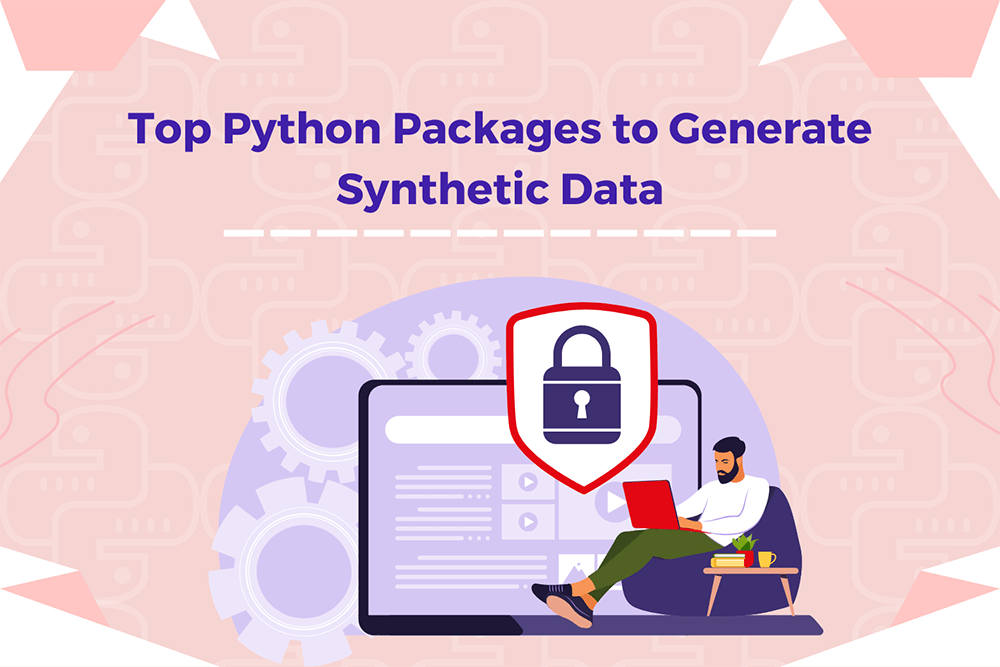Data is the foundation of every data project; data analysis, machine learning model training, and even a simple dashboard all require data. As a result, gathering the data required for your project is critical.
However, it is not always the case that the data you seek exists or is publicly accessible. Furthermore, you may wish to test your data project with “Data” that meets your criteria. That is why, when you have certain requirements, creating your data becomes critical.
While it is vital to generate data, manually gathering data that suits our objectives would take time. As a result, we may try to synthesize our data using a computer language.
In this article, we will see the top Python Packages to generate the Synthetic Data.
Top Python Packages to generate the Synthetic Data are as follows
DataSynthesizer
DataSynthesizer produces simulated data from a given dataset. It intends to make cooperation between data scientists and owners of sensitive data easier. It employs Differential Privacy methods to offer a high level of privacy protection.
Pydbgen
Based on the data types selected by the user, this Python tool produces a random database TABLE (or a Pandas dataframe, or an Excel file) (database fields). The quantity of samples required can be specified by the user. A PRIMARY KEY can also be specified for the database table. Finally, the TABLE is placed into the user’s choice of new or existing database file.
Sometimes a simpler method is required. For example, perhaps you just need to produce a few common variables with some level of flexibility. In this instance, you can use Pydbgen, a programme that allows you to produce a variety of data formats, including:
- Name, nation, city, genuine (US) cities, real (US) states, zip code, latitude, and longitude;
- Month, day of the week, year, time, and date;
- Personal email, official email, and Social Security Number;
- Company, job title, phone number, and licence plate are all required.
It may generate data in a variety of forms, including:
- DataFrames
- Pandas
- sqlite3 databases
- Excel files
Mimesis
Mimesis is comparable to Pydbgen, however it provides a more comprehensive solution. Mimesis works with a variety of data sources and contains ways for creating context-aware columns. Furthermore, it provides thirty-four language localizations with a high level of specificity (for example, real Brazilian social security numbers or Romanian addresses), making it ideal for constructing legitimate, diverse synthetic datasets.
Mimesis is a high-performance Python fake data generator that generates data for a number of applications in a variety of languages. The bogus data may be used to populate a testing database, generate bogus API endpoints, generate arbitrary JSON and XML files, anonymize production data, and so on.
Synthetic Data Vault
The Synthetic Data Vault (SDV) is a library ecosystem that allows users to rapidly study single-table, multi-table, and timeseries datasets in order to produce new Synthetic Data with the same structure and statistical attributes as the original dataset.
The Synthetic Data Vault (SDV) package is not a library, but rather an environment. It provides numerous methods for producing synthetic data, such as multivariate cumulative distribution functions and Generative Adversarial Networks. It also includes a validation framework and a benchmark for synthetic datasets, as well as the ability to produce time series data and datasets containing one or more tables.
Plaitpy
plait.py is a Python script that generates bogus data from composable yaml templates.
The concept of plait.py is that it should be simple to represent fictitious data with an appealing form. Many fake data generators now model their data as a collection of IID variables; with plait.py, we can stitch those variables together into a more cohesive model.
Here are some examples of how plait.py may be used:
- creating simulated application data in test environments
- proving the use of statistical approaches
- developing fake datasets for database performance optimization
Faker
Faker is a Python library designed to make it easier to generate fake data. The Faker package serves as the foundation for several future data synthetic generator python tools. Faker is for you if you need to bootstrap your database, make nice-looking XML documents, fill-in your persistence to stress test it, or anonymize data retrieved from a production service.
Gretel
Gretel, sometimes known as Gretel Synthetics, is an open-source Python tool that generates structured and unstructured data using a Recurrent Neural Network (RNN). The Python package technique interprets the dataset as text data and trains the model on it. The model would then generate synthetic data based on text data (we need to transform the data to our intended result).
Gretel needs some substantial computing power because it is built on the RNN, therefore if your PC is not powerful enough, I propose utilizing the free Google Colab notebook or Kaggle notebook.


